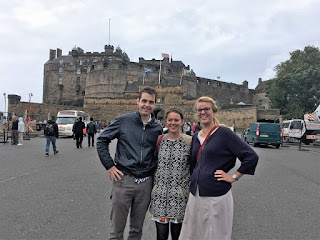"Yes, that's it!" said the Hatter with a sigh, "it's always tea time."
― Lewis Carroll, Alice in Wonderland
Thanksgiving in Scotland
...can be a lovely thing. The School of Divinity Postgraduate committee (of which I am part) put together a dinner in what I like to call our Great Hall. So far as traditional Thanksgiving fare goes, it was a valiant and lovely attempt, featuring as it did a stack of fruitcakes, an admirable selection of fine cheeses, and microwaved stuffing which I plopped out of its plastic containers onto trays I found in the PhD kitchen.
The pictures don't do it justice, I think because it's a dark room with rich colors and high windows, but it really does look like a (slightly) smaller version of the Great Hall.

All this talk of food brings me very naturally to...
Grocery shopping in Scotland
I recently switched my grocery habits to Lidl, which is cheaper than Tesco but much more frightening, as it bears far less resemblance to an American grocery store in both size and structure.

They are terribly keen on self-checkout here, and also on bringing your own grocery bags (which cost 5 pence otherwise.)
When you make a mistake in self-checkout, the machine makes a loud croaking noise, and the light at your station flashes red. You have to wait until a clerk comes to reset the operation, then you stand there looking sheepish while he does so.
This always happens to me at least two times every single time I use the self-checkout.

This section is usually full of fresh pretzels, chocolate twists, and Nutella-filled crescents. I usually buy three to four.

I splurged on this monstrosity to go with the soup that I will make with the leftover turkey and gravy.
Scottish grocery stores don't refrigerate the eggs. I have no idea why.
This butter is terribly tasty, but I still don't know how it compares to US measurements, which is one reason that my cookies come up differently every time I make them. The girls on my hall still like them, though, and one classmate at the Thanksgiving dinner ate no fewer than seven!

I have been eating Muesli for breakfast, which is a Scottish staple - one of those oat-and-raisin concoctions that makes you feel very healthy while eating it (only it tastes like cotton, so I add fruit-flavored yogurt.) With the onset of cold weather, I am switching to porridge with Sultanas (see below).
The main reason I now shop at Lidl is because they carry an off-brand of Stopwafels (ie cheaper - I am actively representing an experimental "do Europe on a budget" research study. Inquire within to make a non-tax-deductible contribution.). They are a round, caramel-filled, and highly addictive waffle-based treat to be eaten with coffee or tea.
Where Stropwafels are concerned, I always consider it tea-time.
― Lewis Carroll, Alice in Wonderland
Thanksgiving in Scotland
...can be a lovely thing. The School of Divinity Postgraduate committee (of which I am part) put together a dinner in what I like to call our Great Hall. So far as traditional Thanksgiving fare goes, it was a valiant and lovely attempt, featuring as it did a stack of fruitcakes, an admirable selection of fine cheeses, and microwaved stuffing which I plopped out of its plastic containers onto trays I found in the PhD kitchen.
The pictures don't do it justice, I think because it's a dark room with rich colors and high windows, but it really does look like a (slightly) smaller version of the Great Hall.

All this talk of food brings me very naturally to...
Grocery shopping in Scotland
I recently switched my grocery habits to Lidl, which is cheaper than Tesco but much more frightening, as it bears far less resemblance to an American grocery store in both size and structure.

They are terribly keen on self-checkout here, and also on bringing your own grocery bags (which cost 5 pence otherwise.)
When you make a mistake in self-checkout, the machine makes a loud croaking noise, and the light at your station flashes red. You have to wait until a clerk comes to reset the operation, then you stand there looking sheepish while he does so.
This always happens to me at least two times every single time I use the self-checkout.

This section is usually full of fresh pretzels, chocolate twists, and Nutella-filled crescents. I usually buy three to four.

I splurged on this monstrosity to go with the soup that I will make with the leftover turkey and gravy.
Scottish grocery stores don't refrigerate the eggs. I have no idea why.
This butter is terribly tasty, but I still don't know how it compares to US measurements, which is one reason that my cookies come up differently every time I make them. The girls on my hall still like them, though, and one classmate at the Thanksgiving dinner ate no fewer than seven!

I have been eating Muesli for breakfast, which is a Scottish staple - one of those oat-and-raisin concoctions that makes you feel very healthy while eating it (only it tastes like cotton, so I add fruit-flavored yogurt.) With the onset of cold weather, I am switching to porridge with Sultanas (see below).
The main reason I now shop at Lidl is because they carry an off-brand of Stopwafels (ie cheaper - I am actively representing an experimental "do Europe on a budget" research study. Inquire within to make a non-tax-deductible contribution.). They are a round, caramel-filled, and highly addictive waffle-based treat to be eaten with coffee or tea.
Where Stropwafels are concerned, I always consider it tea-time.







































